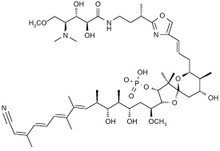 Loading... Please wait...
Loading... Please wait...Categories
Calyculin A
Purity > 98.0%
| CAS Number: | 101932-71-2 |
| Chemical Formula: | C50H81N4O15P |
| Molecular Weight: | 1009.17 g/mol |
Calyculin A is a powerful phosphatase inhibitor. It has been found to stop the growth of protein phosphatase (PP1), and protein phosphatase 2A (PP2A). Further studies have shown it also inhibits the growth of some endogenous phosphatases found in some smooth muscles. This discovery has lead to further studies with osteosarcomas and other muscle tumors.
Calyculins are naturally occurring products derived from a marine organism, a sponge called Discodermia calyx, found in the Gulf of Sagami in Japan. They are extremely toxic, and based on research published in 1990, were found to inhibit the growth of starfish as well as inhibiting the development of L1210 Leukemia cells. What is particularly interesting is that even though Calyculin A works in similar ways to okadaic acid, Calyculin A far outclasses okadaic acid in inhibiting PP1, because okadaic acid has no effect on the activity of this phosphatase.
It has been shown that neither Calyculin A or okadaic acid have any affect on acid, or alkaline phosphatase or any of the phospho-tyrosine phosphatases.It is believed that Calyculin A works on cellular activity in a similar way to okadaic acid, another tumor promoter, even though Calyculin A is unrelated structurally to okadaic acid.
Calyculin A has been found to have several derivatives, Calyculin B, C and D. They all appear to have similar properties.
Calyculin A is soluble in DMSO, methanol, acetone, ethanol, chloroform, benzene, methylene chloride and acetonitrile and not in water.
Calyculin A and it's derivatives have been used in research into a number of tumors because of the inhibitory properties exhibited by this compound. Additional research reported in 2003 raised the possibility of Calyculin A being used in the study of human chromosome morphology. The research with human lymphocytes was to see if Calyculin A would have a place in work with human karyotyping. There has also been ongoing research into finding additional derivatives of Calyculin A, and to date, there are now 10 known naturally occurring derivatives.
Comparable Items:
| Alfa Aesar | J61952-EXG |
| EMD Millipore | 208851-10UG |
| Matrix Scientific | 066903-5G |
| Matrix Scientific | 066903-1G |
| Matrix Scientific | 066903-25G |
| VWR | 1336/100U |

